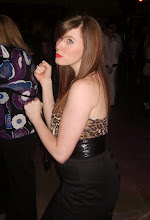
This weekend I went back to my Sunny (?) home town of Newcastle. It was so good to be back and see friends as well as telling everyone about my new job at St Mary's. But it wasn't all fun and games, I went back to deliver a keynote speech at a Secondary School to speak to a group of English teachers about 'Putting Fun Back Into Practise'. This is a subject which is incredibly close to my heart knowing the difficulties I had at school as a youngster. I didn't find out I was dyslexic until I was 22 and studying for my MA. This was a daunting prospect at this point in my career and I found it very difficult to adjust.
However, in hindsight I believe my dyslexia had a lot to do with the disenchanted feelings I had as a students in my younger years. Never feeling like I really fitted in, finding everything much harder than everyone else seemed to, finding writing a constant strain and struggle (look at me now! Writing for fun heaven forfend!). I didn't have much 'fun' in the classroom and have spent all of my teaching career so far trying to find ways that I can put 'fun' back into my own teaching and communicate with learners of all kinds through many different mediums. I try not only to teach the 'right' words and the 'right' ways to perform, but also enhance what I consider to be essential life skills; spontaneity, creativity, child like behaviour and imagination. All of which are at our disposal but need to be untapped. I found Keith Johnstone's book 'Impro' an inspiration. He talks a lot about his experiences as a students and expresses much the same as I felt. Saying that if you feel like your inspiration is being quashed you will finally stop speaking for fear of being 'wrong' or of 'failing'. So I propose an education-wide banishment of the words 'right' or 'wrong'. Instead people should be free to experiment, play, explore and develop in whatever ways they choose. By doing this not only will our students minds be opened but as will the minds of our future leaders and people of important roles in society. By creating a world where we don't censor ourselves, where we ask questions about everything around us then nothing becomes 'taboo', nothing is 'naughty', nothing is 'bad'. Instead everything becomes a positive learning experience where we learn to choose, to be self advocates, be self aware and create our own boundaries of what is personally acceptable and what is not. Needless to say this was a little too much for my friends in Newcastle I feel. And what was more bizarre was that they seem to be scared of their own students?? A lot of the work was deemed too much, too 'over the top', 'not what the students would involve themselves in'. But, in truth, not anything that the teachers would be happy to try for fear of 'failure' or fear of being 'wrong'. And that is the crux. Can we banish these words in the classroom for our students if the teachers are using these words in regards to their own learning/teaching everyday??
I suddenly had a much greater understanding of my students frustration at Undergraduate level. And I think it will take a positive cultural and educational revolution to change it. Anything less may just be lost.
Any thoughts??

This is such a tough area. I suspect there's a genuine need to empower teachers to see themselves as responsibile creative artists rather than civil servants whose routine and practice is set. Difficult in a target driven culture. Interestingly I've had some comeback on my Mother Courage blog from a Andy, an FE drama lecturer. He's on the front line and clearly optimistic about the ability of techers to rise above the prescribed and have a pride in their role as educators.
ReplyDelete